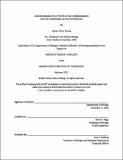Understanding the effects of sex chromosomes and sex hormones on sex differences
Author(s)
Zhang, Qinze Arthur.
Download1251767377-MIT.pdf (346.1Kb)
Other Contributors
Massachusetts Institute of Technology. Department of Biology.
Advisor
David C. Page.
Terms of use
Metadata
Show full item recordAbstract
Biological factors that determine sex and drive sexual differentiation have long been established in humans and other mammalian species. Yet there is a limited understanding of the mechanisms by which these factors give rise to sex-biased outcomes in health and disease. Growing evidence for sex differences in preclinical and clinical studies has led to research funding regulations that require clinical studies and drug trials to account for sex as a biological variable. This new wave of interest in sex differences is focused on three aspects: First, what factors show quantitative sex differences at the molecular and cellular levels, and how are they regulated, over the course of a lifetime, by the classic sex-biasing factors, i.e., genes encoded on the sex chromosomes and sex steroid hormones secreted by gonads. Second, can we utilize knowledge of sex differences (e.g., sex-biased gene expression) gained from studying model animals to generate and test hypotheses regarding these sex-driven variables in a multitude of biological functions of interest. Third, can we translate basic knowledge of sex differences into new therapeutic targets/strategies that alleviate sex-biased outcomes in common diseases, developing sex-specific treatments or extending sex-biased protection from one sex to the other. In this thesis, I will first review the fundamental causes of sex differences and the classical strategies used to study sex-biased phenotypes. Next, I will introduce existing mice models (i.e., the "Four-Core-Genotype", XY* and Sex Chromosome Trisomy models) that aid in delineating the effects of sex hormones and sex chromosomes on sex differences. Finally, I will highlight the insights gained from recent studies using these mouse models and discuss the need for a "systems approach" in future studies of sex differences. (276 words.)
Description
Thesis: S.M., Massachusetts Institute of Technology, Department of Biology, 2021 Cataloged from the official version of thesis. Includes bibliographical references (pages 17-21).
Date issued
2021Department
Massachusetts Institute of Technology. Department of BiologyPublisher
Massachusetts Institute of Technology
Keywords
Biology.